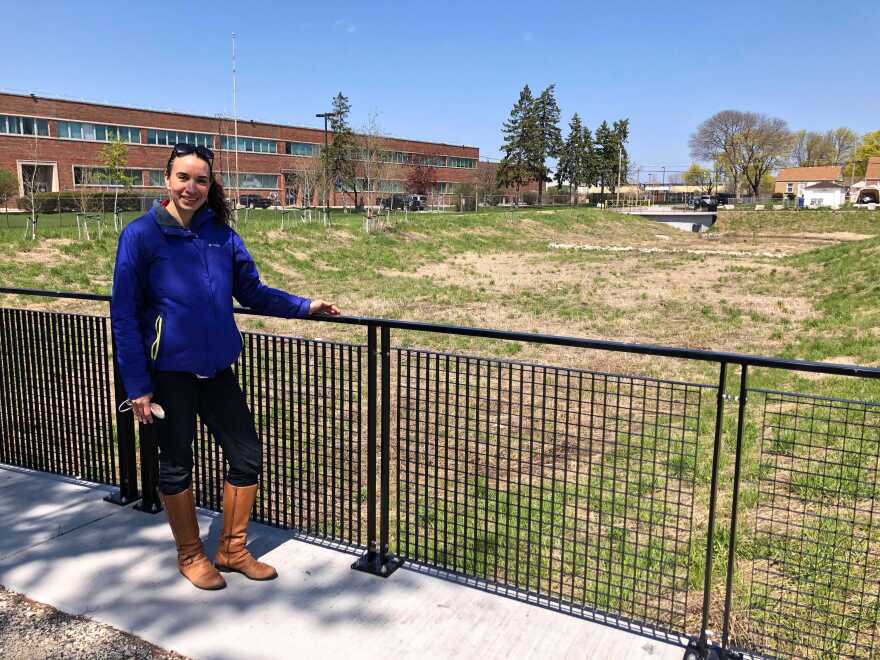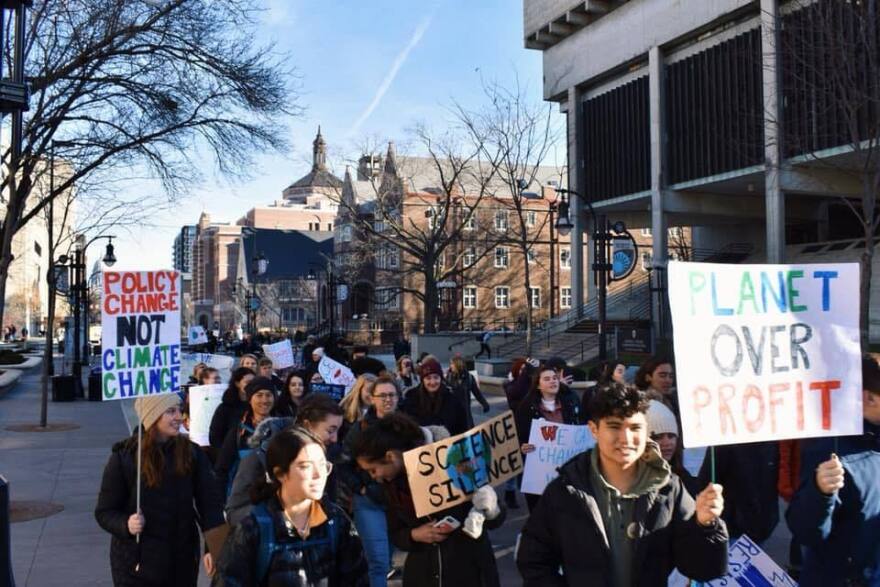As WUWM's 2021 Earth Week series comes to a close, we look at climate action.
In Wisconsin, the Evers’ administration hopes to make a difference through its soon-to-be-unveiled clean energy plan. Environmental groups, students and municipalities are among a growing throng developing and acting on climate strategies.
Standing about 12 blocks south of Milwaukee native Pam Ritger’s childhood home at 42nd Street and Capitol Drive is a giant stormwater detention basin.
It may not seem extraordinary or exciting, but Ritger disagrees.
“This interesting site actually used to be home to 10 homes that were continually flooded out and most severely in the July 2010 catastrophic flooding that we experienced caused about $37 million in damage,” she explains.

When plans to build on the site were being put together, neighbors made their voices in what was engineered here heard.
“I remember going to one of the first meetings back in 2013 and there were some pictures up of stormwater detention basins that were completely fenced off and the community members who were there were kind of off-put by that. They preferred a green space that would be accessible and be green and provide this like green amenity, again in the middle of the city where there’s less green space than maybe in surrounding communities,” Ritger says.
And, that’s what they got. The Milwaukee Metropolitan Sewerage District engineered project includes a meandering path that rings the basin, while native plants and trees take hold in the space.
Ritger says infrastructure projects like this — that increase neighborhood resiliency and involve neighbors in the process — is part of what Milwaukee needs to combat climate change.
She joined the City-County Task Force on Climate and Economic Equity to help make that happen.
“I think Milwaukee’s plan is different even from other communities in Wisconsin in that we have created these work groups. There’s a work group on green buildings, there’s a work group on transportation and mobility, there’s a work group on jobs and equity, and that was done intentionally to make sure that we are getting community voices and stakeholder voices involved to come up with policies and projects that can be implemented here in the city,” she says.

The urgency of climate change altered Ritger’s career path. She was working in immigration law as a paralegal and says, “When I just saw the climate crisis and just felt I needed to be a part of it. I needed to understand energy, I needed to understand energy law and why different decisions were being made and so that’s when I went back to school, I focused on environmental law and energy law.”
For Ritger, she says inaction is not an option.
“I have three young girls and I worry about the future they will face if we don’t take action now,” she says.
Maria Redmond is busy hammering out the final revisions of the state’s clean energy plan. A plan, she hopes, will be unveiled next month. Redmond heads Gov. Evers' Office of Sustainability and Clean Energy.
“We put this long list of strategies together and we basically have been narrowing them down to cover the power sector, building and industrial sector, agriculture, state and local government and transportations with recommendations that can move the needle faster,” she says.
Redmond says the plan is not one of those “write it and stick it on a shelf” projects. It’s designed to be actionable, she says — for example, say you’re a local government “working directly with local governments and like, what do you need local governments, how can we help you, how can the clean energy plan be the tool to get you the resources you need."
She adds, "We want public input too. So if there’s missing pieces we want to get the input and make it attainable for everyone.”

Marina Minic, a UW-Madison senior, turned to Redmond for advice. Minic is looking for ways to push her school to transition to 100% renewable energy by 2035.
“I am on the executive board of Campus Leaders For Energy Action Now, that stands for CLEAN. It’s student-led and grassroots,” she says.
Minic passionately believes college campuses can be catalysts for change, with some nudging.
“Madison, according to the STARS report that came out in 2020, that’s sustainability tracking and rating system. We scored the worst in terms of fuel emission out of the Big 10, like we emit the most greenhouse gases. So, I see it as, I would really love it to be focused on college campuses, all kind of pushing each other to be the best, almost in competition, because the prize is a pretty good prize, I would say,” she says.
For Minic, the prize wouldn’t be cash or a trophy — the prize is beating climate change.
Have an environmental question you'd like WUWM's Susan Bence to investigate? Submit below.
_






